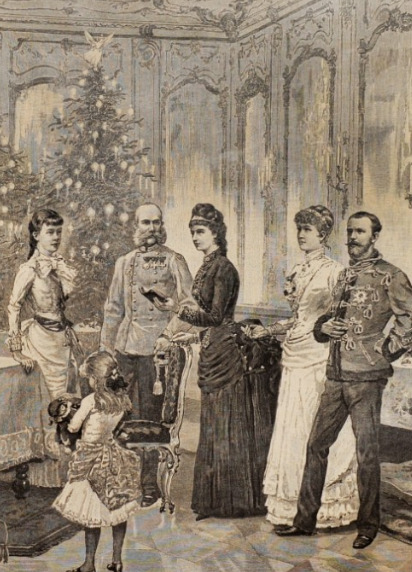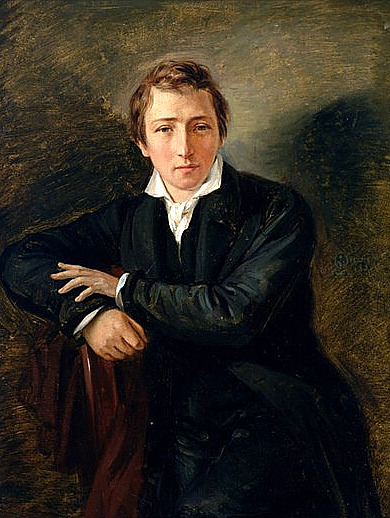#historian: brigitte hamman
Text
“Did you bring the Heine souvenirs with you?”: Rudolf’s last Christmas present for his mother


As Christmas approached, I started to search for Habsburg stories related to this holiday to share with you, and almost inevitably I once again looked into Crown Prince Rudolf’s last Christmas. The Christmas Eve of 1888 is known mostly for having been full of ominous signs of Rudolf’s deteriorating mental health that his family either was unable to notice or simply chose to ignore. I have a second post coming up related to that, but in this post I’m covering a different topic: the last present Rudolf gave to his mother, Empress Elisabeth.
December 24 was a special day for the Imperial family not only because it was Christmas Eve, but also because it was Elisabeth’s birthday. It was, then, a double celebration for the family. And on the 24th of December of 1888 the Crown Prince surprised his mother with a very special gift: a bundle of letters written by her favorite author, the poet Heinrich Heine.
Elisabeth’s deep admiration for Heine was well known: months earlier she had publicly supported and financially collaborated in the creation of a monument in honor of Heine in Düsseldorf, the poet’s hometown. The project, however, had a huge backlash by the anti-semites and German nationalists (Heine was Jewish), and soon Elisabeth was attacked by them. The campaign against Heine’s devotees in the press was so strong that eventually Elisabeth was forced to withdraw her support; the monument, rejected from city to city in Germany, finally was placed in New York, where it still stands (Hamann, 1978, 1986).
Rudolf, who had long been a supporter of Jewish rights, was probably happy to find that his mother shared his sentiments regarding the growing anti-semitism of the late 19th century. It was likely the fiasco of the monument that prompted Rudolf to get the Empress a Heine-related birthday and Christmas gift. For this task he asked his friend, journalist Moritz Szeps, to travel to Paris and acquire for him a bundle of letters that Heine wrote to his friend Alexander Weill. We can find a mention of it in this undated letter Rudolf wrote to Szeps, likely from the first days of December (translation by DeepL, nuances may be lost):
Dear Szeps!
I am glad to know you are here; I would like to thank Frischauer [another journalist friend of Rudolf and Szeps] very much for his letter yesterday and its enclosures. Did you bring the Heine souvenirs with you? I hope to see you in the next few days. With best regards
Your Rudolf (Szeps, 1922, p. 168)
And again, on December 11:
Dear Szeps!
Thank you very much for your letter. Please have Heine’s letters photographed and only then send them to me.
I hope to be able to see you the day after tomorrow.
With warmest regards
Your Rudolf (ibid)
In 1908, writing in the December 25 edition of the Neue Freie Press, Hugo Wittmann claimed that Weill, instead of money, had demanded “nothing more for his treasure than that the Crown Prince asked him for it in writing and send him a photographic copy of the papers upon receipt” (DeepL translation) which would explain why Rudolf asked Moritz to first photograph the letters before sending them to him. Historian Brigitte Hamann, however, claims differently: according to her the Crown Prince in fact paid an exorbitant amount of money for the letters. Whatever the case, when the Imperial family opened their presents at 4 o’clock in the afternoon of Christmas Eve, Elisabeth found a packet full of letters of her favorite poet.
This was, no doubt, a touching personal present that shows how much Rudolf cared for his mother. But what did Elisabeth think of this gift? As always, Hamann’s The Reluctant Empress is very straightforward:
In order to prove that he revered his mother, Rudolf paid an outrageous price in Paris for eleven Heine autographs and placed them under the Christmas tree for the Empress. Elisabeth, however, was so preoccupied with her daughter's engagement that she did not pay Rudolf’s gift the attention he had expected. (1986, p. 339)
Reading this, I’ve always felt sorry for Rudolf: he clearly put a lot of thought into finding the perfect present for his mother, only for it to go unnoticed. At least, that’s what I believed until I read Hamann’s previous work, her biography of the Crown Prince published first in 1978:
Whether the Empress appreciated the shy homage of her son, whether she felt how much he practically vied for her understanding, since both of them were attacked by the same people, is highly unlikely. According to all sources, Elisabeth at this time was totally occupied with Valerie, her “only one,” with her engagement and the impending pain of parting with her favorite child. (2017)
“Highly unlikely”. No source backing this up. It was then when I realized that Elisabeth disregarding her son’s present was pure speculation on Hamann’s part. Between her biography of Rudolf and her biography of Elisabeth she seems to have convinced herself that the empress didn’t care for the letters at all, and “unlikely” became just “she did not pay attention”.
I won’t be too harsh on Hamann: I also think Elisabeth’s main concern that Christmas was Valerie’s engagement. According to Valerie’s diary, both her parents were very moved that day because she was going to get engaged in the evening. But that doesn’t have to mean that Elisabeth didn’t care for Heine’s letters. We just don’t know what Elisabeth thought of the gift, since (as far as I could find) none of the people that were present during the unwrapping of the gifts wrote down her reaction. Valerie only wrote in her diary that “Little Elisabeth [Rudolf’s daughter] was very happy about the presents and played with her things while we dined in the Alexandrian room on the left” (1998, p. 164). And the next time Rudolf wrote to Szeps, on December 27, the only allusion to the past Christmas Eve he made was thanking him for his “congratulations on the happy family event” (1922, p. 168) i.e. the engagement of his sister. No mention of Heine by anyone, anywhere.
We do also have, however, an interesting account of the opening of the presents in Egon Corti’s 1934 biography of Empress Elisabeth:
And so Christmas Eve, 1888, came round, and with it Elizabeth’s birthday. Rudolf and his wife were among the guests, and the Crown Prince presented his mother with Hugo Wittmann’s edition of Heine’s letters, at which Francis Joseph cast an ironical glance but made no comment. (p. 386)
No mention of Elisabeth’s reaction to the letters, but he does give us Franz Josef’s. Sadly Corti does not give a source for this account, which opens a new mystery: from where did he learn this? There is a mistake in the quoted fragment: the letters Rudolf acquired were original, written by Heine himself; Hugo Wittmann only published them in the aforementioned Neue Freie Press edition of 1908. But I wouldn’t straight up disregard this account either: not only Corti had access to now lost primary sources, he also worked closely with Valerie’s children. Who knows, maybe this was a family anecdote he learned from them.
So, did Elisabeth ignore her son’s thoughtful gift because all she cared about was Valerie’s engagement? We can’t know for certain. I think it is safe to assume Valerie was her main priority that day, but unless a primary source that explicitly states that she did not care for the letters appears, I don’t think it’s right (nor fair) to claim that she was indifferent to Rudolf’s present.
Sources:
Corti, Egon Caesar Conte (1936). Elizabeth, empress of Austria (translation by Catherine Alison Phillips)
Hamann, Brigitte (2017). Rudolf. Crown Prince and Rebel (translation by Edith Borchardt)
Hamann, Brigitte (1986). The Reluctant Empress: A Biography of Empress Elisabeth of Austria (translation by Ruth Hein)
Schad, Martha and Schad, Horst [ed.] (1998). Das Tagebuch der Lieblings Tochter von Kaiserin Elisabeth. 1878-1899
Szeps, Julius [ed.] (1922). Kronprinz Rudolf. Politische Briefe an einen Freund. 1882-1889
Wittmann, Hugo (1908, December 25). Ein Geschenk des Kronprinzen Rudolf an seine Mutter, Neue Freie Press
#tl;dr: hamann's bias strikes again#crown prince rudolf of austria#empress elisabeth of austria#heinrich heine#historian: brigitte hamman#historian: egon caesar conte corti
25 notes
·
View notes
Text
I went quickly through Hamann’s book to answer that ask and I came across a really good exemple of her negative bias. Take this paragraph:
Elisabeth’s father, Duke Max, had always taken a highly critical view of his daughters, including Elisabeth. On the occasion of his diamond wedding anniversary in September 1888, he read to the assembled family his favorite passage from a newly published book, Das Nervöse Jahrhundert (The Nervous Century) by Paolo Mantegazza: “The nervousness of those who do no work can be cured only gradually—not until, that is, the dukes, counts, and barons teach their children that work is the best occupation for the nobility and at the same time the surest road to a long and happy life.” This quotation was soon afterward reprinted in a celebratory article on the anniversary in the Vienna Fremdenblatt—coming close to public criticism of the Empress. The relationship between Elisabeth and her father, who was quite ill by this time, was so bad that she did not even attend his funeral in Munich in November 1888—officially because of her own precarious health.
The source for the first part of the segment is the entry “Maximilian in Bayern” in the Allgemeine Deutsche Biographie. She, however, does not source the last part of the paragraph. Hamann is pretty clear: Elisabeth had such a fall out with her father that she made up an excuse to not go to his funeral. An statement that completely falls apart when you remember that we literally have the telegram in which Franz Josef asked his wife NOT to go:
I advise you most earnestly not to go to Munich, for in the present cold state of the weather, you might easily be taken ill, and as I have an impression that Papa [Duke Max] is rapidly approaching his end, you would be sure to arrive too late. Should I unfortunately happen to be right, I will be certain to attend the funeral at Munich myself.
In fact, the way this telegram is worded sounds as if Elisabeth had tried to go to Munich to see her father before receiving the request (which might as well be an order) from her husband to stay where she was (I think she was in Corfu?). This is not brand new, groundbreaking information: the book that contains this telegram was published in 1924. I couldn’t find it in the bibliography, so maybe this wasn’t in bad faith, but even if Hamann truly didn’t know about the telegram, claiming that Elisabeth not going to the funeral was totally because she didn’t want to and the health issues were just an excuse (without even backing it up with a different source!) is a reach, and only shows her bias.
#i do think the reluctant empress is overall a good biography#but it's full of little things like this which are really annoying#historian: brigitte hamman#empress elisabeth of austria#the reluctant empress#maximilian joseph duke in bavaria
9 notes
·
View notes